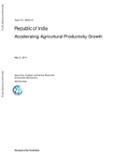State and Trends of Carbon Pricing 2014
This report follows the evolution of
carbon pricing around the world. Last year's report
mapped the main carbon pricing initiatives. This year the
report presents the status of each of these developing
initiatives and explores the emerging trends of carbon
pricing. The focus is on the recent highlights from around
the world and on key lessons that can be drawn from the
growing experience. Despite the difficult ongoing



